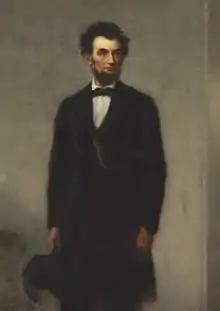Joseph Ames | |
|---|---|
 Ames in 1859 | |
| Born | July 16, 1816 Roxbury, New Hampshire, U.S. |
| Died | October 30, 1872 (aged 56) |
| Occupation | Artist |
| Spouse | Sarah Fisher Ames |
| Relatives | Nathan Ames (brother) |
Joseph Alexander Ames (1816–1872) was an American artist, primarily known for portrait and genre painting.
Biography
Originally named Joseph Emes, he was born in Roxbury, New Hampshire.[1] Ames began painting at a young age. At the age of twelve Henry Theodore Tuckerman wrote about one of his paintings. After moderate success at home in Saugus, Massachusetts, he left for Boston in 1841. While in Boston, Ames tried to replicate the style of Washington Allston. In 1848, Ames traveled to Rome, where he painted a portrait of Pope Pius IX that was featured at the National Academy of Design's annual exhibition in 1850. When he returned from Italy he was commissioned by Rufus Choate, Daniel Webster, and Abraham Lincoln. He kept a studio in Boston in Amory Hall (ca.1849),[2] and later on Tremont Street (ca.1856),[3] and then on Summer Street.[4] Ames exhibited at the Boston Athenæum, the National Academy of Design, and the Pennsylvania Academy. He eventually moved to Baltimore, and then to New York, where he died of a "brain fever". He died on October 30, 1872.[1]

Ames was one of the founding Members of the Boston Art Club. He was elected a member of the National Academy of Design in 1870.[1]
His brother Nathan was a poet and patent solicitor who invented many machines, including the escalator. His wife, Sarah Fisher Ames was a sculptor.
References
- Who Was Who in America, Historical Volume, 1607-1896. Marquis Who's Who. 1967.
- Samuel Wadsworth (1932). Historical Notes of Keene and Roxbury. Sentinel Printing Co.
- David B. Dearinger (2004). Painting and Sculpture in the Collection of National Academy of Design. Hudson Hills.
- Making of America Project (1885). The New England Magazine. New England Magazine Co.
External links
- Joseph Alexander Ames at American Art Gallery
- Museum of Fine Arts, Boston. A Gypsy Girl, by Ames, about 1850–70
- Boston Art Club
- Askart.com page